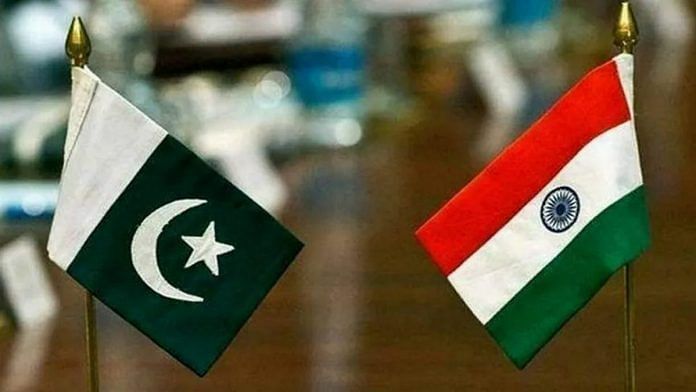New Delhi: While the top leadership in India and Pakistan do not appear to be open to engaging in peace dialogues, officials, retired diplomats, defense personnel, former intelligence officials, and academics have met at least four times this year in locations such as Bangkok, Muscat, and London as part of the Track II process, ThePrint has learnt.
Unlike Track I diplomacy, which is a peacemaking tool involving government-to-government interaction, Track II dialogues bring together a mix of officials and individuals from diverse professions to make constructive recommendations and, in a way, work to create conducive atmospheres for Track I engagement.
Earlier this month, Home Minister Amit Shah ruled out talking to Pakistan at a rally in Jammu and Kashmir when he said, “Some people are giving me suggestions that I should talk to Pakistan…But I am clear, I don’t want to talk to Pakistan. I would talk to Gujjars and Paharis of Baramulla. I will talk to the youth of Kashmir.”
Similarly, Pakistan Prime Minister Shehbaz Sharif said last week that he is ready to engage with India, but with a caveat — so long as New Delhi shows “sincerity of purpose”.
This comes three years after relations between India and Pakistan hit new lows following the Indian government’s decision to revoke special status in Jammu and Kashmir.
A Hindustan Times report Thursday said that prior to Shah and Sharif’s statements, serving and retired officials from India and Pakistan held discussions behind closed doors at the 15th edition of the Southern Asia Security Conference in Muscat, Oman from 17-18 September. RSS leader Ram Madhav confirmed to ThePrint over a phone call that he was an attendee.
Earlier in May, a similar dialogue was held in Bangkok, Thailand, attended by the likes of Congress MP Manish Tewari.
Also Read: With Pakistan, peace is just a punctuation. Why Amit Shah’s Kashmir statement is no surprise
Discussions on ceasefire, importing Indian medicines
A source privy to the recent meetings told ThePrint that both sides expressed that they wanted to build on the 2021 ceasefire agreement , and also discussed the prospect of importing Indian medicines to help with floods and pandemic recovery in Pakistan.
“There were, as usual, questions from the Indian side on what is the thinking in Rawalpindi with the Pakistan Army. Both sides expressed wanting to continue with the ceasefire agreement and building on the agreement,” said the source who did not wish to be named.
“Softer issues like whether there is openness to resume trade via the Wagah border were discussed, as well as the prospect of importing Indian medicines to help with the floods and pandemic recovery in Pakistan,” they added.
London-based political analyst Ayesha Siddiqa, who has attended Track II dialogues in the past, claimed: “At one of the recent Track 2 dialogues, one of the Pakistan generals is believed to have said Pakistan had lost control of the Taliban very early on, which is partly incorrect. That was said to create an impression that the Taliban is independent of Pakistan.”
A source with knowledge of a Track II meeting in London that took place in April this year, explained that challenges and opportunities for crisis management were put forth by both sides. There was also a discussion around “how the national media reflects border issues”, the source added.
“One point raised was that when both sides are in crisis mode during say a Pulwama or Balakot situation, the media in respective countries are expected to put forth nationalistic postures,” said the source, speaking on the condition of anonymity.
“Further, there aren’t enough correspondents on either side to offer independent reports, and therefore, there isn’t a good grasp of what’s happening in Pakistan. I presume they have the same problem vis-a-vis India,” they added.
Also Read: As terror watchdog FATF considers reprieve for Pakistan, Jaish-e-Mohammed is expanding seminary
The need for Track II
In August, four months after becoming Pakistan PM, Sharif offered seemingly positive statements of wanting “permanent peace” with India.
However, Siddiqa said there could be a strategic motive behind such statements.
“Even if Sharif is expressing the intention of peace somewhere down the road, it’s also strategic because what he’s trying to say is that the problem is not just with Pakistan. Track 2 dialogues are considered important to assess the mood on the other side and to send messages across,” she said.
(Edited by Theres Sudeep)
Also Read: ‘Most responsible nuclear State’—Shehbaz Sharif, Imran Khan, Bilawal refute Biden’s Pakistan comment



